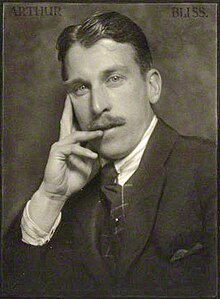Arthur Bliss
Sir Arthur Bliss CH KCVO (London, 2 August 1891; died London, 27 March 1975) was a British composer. When he started composing, his music sounded very modern and harsh. As he got older he changed his style and wrote more Romantic music in the style of English composer Edward Elgar. For more than twenty years he was Master of the Queen's Music.
Arthur Bliss | |
|---|---|
 | |
| Born | Arthur Bliss 2 August 1891 London, England |
| Died | 27 March 1975 |
| Occupation | Composer |
| Title | Master of the Queen's Music |
Early life
changeHis father was American, his mother was English. He went to school at Rugby. He went to Cambridge University where he studied with Irish composer Charles Wood. Wood also taught the composer Ralph Vaughan Williams. Bliss got to know Elgar whose music influenced him very much.
For a short time he learned music from Charles Villiers Stanford at the Royal College of Music. During World War I he served in the army.
After World War 1
changeAfter the war he started to play his music in public. These compositions show the influence of Stravinsky, Ravel and Les Six. His music even sounded jazzy. After a few years his music became more Romantic. Elgar asked him to write something for the Three Choirs Festival in 1922. The piece he composed was his Colour Symphony in which he tries to describe colours in music.
During the 1920s his music became more traditional. He wrote a lot of music for movies including music for the movie Things to Come (H.G.Wells). He loved the theatre and composed music for the ballets Checkmate and Miracle in the Gorbals. One of his best works is the choral symphony Morning Heroes (1930). This was written to remember those who were killed in World War I.
America
changeWhen World War II started he was in the USA. He stayed there and taught at Berkeley, California until 1941. Then he returned to England. For a time he was Director of Music of the BBC. He wrote an opera The Olympians. In 1953 he was made Master of the Queen's Music. He kept that position until his death, writing many pieces of music for official royal occasions.
He was given many honours, including the Companion of Honour and the Royal Victorian Order.
In his later years he composed several works for orchestra as well as for choirs.
He died on 27 March 1975. His wife, Gertrude died on 21 November 2008 at the age of 104.
References
changeThe New Grove Dictionary of Music and Musicians, ed. Stanley Sadie ISBN 1-56159-174-2